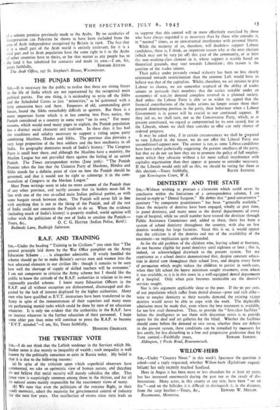DENTISTRY AND THE STATE
Sm,—Without wishing to protract a ciscussion which could never be conclusive within the limitations of a correspondence column, I am forced to reply to " Dental Surgeon." He denies that " good conservative " dentistry " by competent practitioners " has been " generally available." Since the majority of dentists have been engaged, -wholly or part time, in panel dentistry, and many more in the dental departments of every type of hospital, while no small number have treated the destitute through Public Assistance Committees and, added to these, there has been a system of school dentistry throughout the country, with also no few dentists working for large factories. Since this is so, it would appear that the criticism is of the dentists and not of the availability of the treatment—an implication quite unfounded.
As for the old problem of the children who, leaving school at fourteen, do not become eligible for panel dentistry until eighteen or later ; this is, indeed, an acknowledged drawback to the present system. Yet my experience as a school dentist demonstrated that, despite constant educa- tion in dental care throughout their school lives, and despite every form of persuasion which might induce the children to persist in tooth-care, when they left school the barest minimum sought treatment, even where it was availabk, as it is in this town in a well-equipped dental deparmnsent of a hospitaL Only when pain becomes intolerable are the dentist's services sought.
Nor is this argument applicable alone to the poor. If the 90 per cent. of our population which suffer from dental disease—poor and rich alike— were to employ dentistry as their mouths demand, the existing t5,000 dentists would never be able to cope with the work. The deplorable admission must be made that, even where the best treatment is available, far too few avail themselves. Thus, to provide the " first-class facilities " before the intelligence to use them with discretion exists is to provide opera for the deaf and art galleries for the blind. Whether the facilities should come before the demand or vice versa, whether there are defects in the present system, these conditions can be remedied by measures far less costly, far less disturbing to a free and progressive profession than by State control.—Faithfully yours, EDWARD SAMSON. Aldington, 7 Poole Road, Bournemouth.




























 Previous page
Previous page